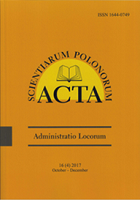Taxation of property given into dependent possession by an entity subject to a property tax exemption
Taxation of property given into dependent possession by an entity subject to a property tax exemption
Author(s): Edyta JóźwiakSubject(s): Business Economy / Management, Economic policy, Fiscal Politics / Budgeting
Published by: Wydawnictwo Uniwersytetu Warmińsko-Mazurskiego w Olsztynie
Keywords: tax law; property tax; business activity; principles of tax law; dependent possession; taxation; tax exemptions; tax preferences; tax rates;
Summary/Abstract: Motives: Does the real property owned by an entity subject to the real property tax exemption and placed in the dependent possession of another entity give rise to an obligation to pay the tax in the amount payable by the entrepreneur? Aim: In a situation where the property is in the possession of the entrepreneur, he is obliged to pay the highest amount of tax – in 2021, the rate of this tax is PLN 24, PLN 84 per m2. However, the Act on Local and Duties and Fees provides for certain exceptions for entities which, due to their activities, benefit from a tax exemption, because of which no funds are credited to the budget of a local government unit. Therefore, it can be concluded that the tax authorities want the largest possible number of properties to be taxed in the highest amount. Their task is facilitated by the fact that the provisions of tax law are not clear as to the definition of “seizure of real estate for conducting business activity”, which allows the tax authorities to freely decide what such activity is and what is not. Recently, an opinion has developed that the mere transfer of real estate into dependent possession based on a civil law contract justifies the statement that the entity conducts business activity. Therefore, the article in question attempts to answer the question whether, and if so, in what amount, the entity that benefits from the tax exemption is obliged to pay tax if it gives the property into dependent possession, and whether it is possible to use tax optimization and make the division of real estate for tax purposes? Results: The interpretation of the provisions of a.l.t. applied by the tax authorities to date, which boils down to the assumption that the mere fact of leasing real estate proves that business activity is being conducted and prejudges the loss of acquired right to tax exemption, is not justified in any way. In the provisions of the a.l.t., the legislator clearly indicates that the subjective use of the real property for purposes that entitle the entity to use the tax exemption is of significance. At the same time, when the tax exemption does not extend to part of the property, it is possible to subdivide it for tax optimisation purposes.
Journal: Acta Scientiarum Polonorum Administratio Locorum
- Issue Year: 21/2022
- Issue No: 1
- Page Range: 115-123
- Page Count: 9
- Language: English

